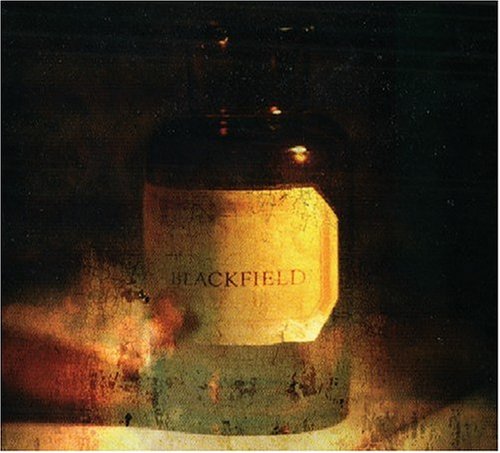If you don't know who Steven Wilson is, I'm going to have to ask you to put this review on hold. Just open another tab for a while and search out the music that this man has made. He's my favorite musician of all time for good reason, and hopefully you can discover why. But for time's sake, here's a summary. Steven Wilson is a multi-instrumentalist singer, songwriter and band leader of the progressive rock outfit Porcupine Tree. He went on to form many, many other projects focused on crafting truly artful representations of different genres. One of those projects is Blackfield, which he started with Israeli poet and songwriter Aviv Geffen. Releasing their debut self-titled album in 2004, the Wilson and Geffen focused on creating what they saw in their mind was "pop music." This included lovely soft meditations of things most songwriters touch on: love, loss, longing, and the like. But there was something so much more to these short little songs, a departure from the long and stretching odysseys of Wilson's Porcupine Tree days. These songs had choruses as catchy as anything in soft rock, but were so lush and covered in beautiful strings and mournful piano and guitar that they really took on a vibrancy of their own.

After collaborating equally on "Blackfield II" in 2007, Wilson took a back seat on Blackfield's next two LP's "Welcome to my DNA" and "Blackfield IV." But when their new album, "Blackfield V" was announced, Wilson announced he would be back into the fold on a 50/50 scale with Geffen. This excited me greatly, considering I view those first two albums as Blackfield's best, and the latter two just didn't reach up to my expectations of what I knew the duo could accomplish. Geffen in particular, God love the man, just isn't in my opinion as accomplished or as talented a songwriter in the melodic (and sometimes lyrical) sense as Wilson is. But with the collaboration equal again, I dived headfirst into the new album anticipating a return to form. After all, the bottle on the cover of the new album is the same as on the debut album, promising a back to basics approach.
Unfortunately, I can tell you that that didn't turn out to be the case. Not all the way at least. The album opens the string driven instrumental "A Drop in the Ocean." It's a lovely little opener promising that the orchestra will be back in full force on this album, which I took as a good sign. The next track "Family Man," had all the trappings of a new classic Blackfield song. Wilson takes the vocal lead and the driving guitar and slightly distorted vocals sound great, but the song just doesn't grab me in the melodic sense. There's not a whole lot of a hook and it kind of meanders in middle ground. In fact, that's the case with the majority of the songs on this new album, unfortunately. Regardless of who sings lead or who wrote the song, a lot of the tracks just don't grab you vocally, which is the bread and butter of any album. The tracks are instrumentally very well crafted and layered, which isn't a surprise to me. But what keeps me sticking around on those old albums are the choruses that just hit you and drill right into your brain, like any good pop music.
The next two tracks actually are some of the best highlights on the album, with big, anthemic sounds. "How Was Your Ride?" reminds me of the track "1000 People" on "Blackfield II." It's a piano driven track that starts contemplative and builds in the choruses to a sweeping conclusion with lovely female backing vocals. Wilson's vocals, which I prefer over Geffen's, are lovely and smooth right into the guitar wall on this one. The next track, "We'll Never be Apart," is a great little nostalgic song led by Geffen. The guitar line and strings in this one conjure up images of the past, and Geffen's emotive voice drives home the attachment felt in this track. It's a nice love song, which Blackfield are great at writing.
Unfortunately, the album goes back into tracks that don't really hook me at this point. These all sound like classic Blackfield songs in structure and musicianship, and even the lyrics are pretty solid. But there's just no hooks to be found on the acoustic ballad "Sorrys," melancholic piano track "Life is an Ocean," or the uptempo rocker "Lately." I have little doubt these tracks might appeal to others who listen, but a good hook is necessary in almost every song I deem worth listening to, and these just didn't cut it.
Fortunately, the next track is a stunner. "October," is probably the best track on the album. Wilson leads this absolutely gorgeous piano ballad that sounds straight off a film scene of a passionate kiss. It's romantic and devastating all at once. I've always admired Wilson as a vocalist. His boyish and clean voice cut right through and blend with the strings like a dance. It's poetic and a must listen.
And then we get into the portion that let me down the most, save for the final song: the final section of the album. "The Jackal" is a track you can pass right over, and "Salt Water," while a lovely instrumental, is just that. "Undercover Heart" is a track that was almost there. It was almost a great track. It has lovely female vocal backing and again, a bright, lush sound that sucks you in, but the melody once again goes nowhere, really. It's a shame too, with how many other facets worked in the track. "Lonely Soul" is my least favorite track on the album. Besides being broken up by some female vocals, it's a repetitive and slightly annoying track with the only main lyrics being "I'm a lonely soul" being repeated over and over.
The final track, "44 to 48" is, thankfully, a flowing and beautiful track about meditation on the past and growing older. Wilson definitely draws from some of his Porcupine Tree work like "Glass Arm Shattering," for the slow rolling synth and keyboard textures on this track. But it really is a lovely finisher to the album and took away a bit of the bitterness from the preceding tracks.
So, I have to call this album what it is for me: a mediocre effort from a duo that I KNOW can create lasting and amazing albums. There are great songs to be had here, but a hook is a hook, and to me at least, great vocal melodies can make or break a song and an album. While the music here is wonderfully constructed and the textures full and gorgeous, as always, the choruses and sticking power of this album is lacking. At least now that Wilson and Geffen are on the team together again, here's hoping the next outing truly brings us back to what worked so well in the first place.

